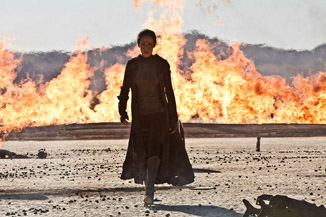Movie Review: Priest
By Matthew Huntley
May 23, 2011
BoxOfficeProphets.com

During the animated prologue, which is surprisingly effective, we’re told that as long as there has been man, there have also been vampires. For centuries, the two groups waged a bitter war that nearly led to the destruction of the world, leaving it a bleak, barren and dreary place. No matter how hard man fought, or with what weapons, they were no match for the vampires, which, in this movie, are grotesque, monster-looking creatures that speed around on all fours, have sharp teeth and growl at their prey. There is really no explanation as to how the first vampires came to be, but never mind; here, they merely function as the things to kill
It wasn’t until the priests came along that man stood a fighting chance. Under the authority of the church (we assume it’s Roman Catholic), the priests were an elite organization trained in vampire warfare. But after they invaded and seemingly eliminated all the vampire hives, the church disbanded them and ordered they assimilate back into society, which no longer required their services.
Priests are now viewed as outcasts, which is made all the easier since they have a crucifix tattooed on their noses. Like the other citizens, they must live in heavily guarded, walled cities where everyone is told “if you go against the church, you go against God.” The look of the city is heavily influenced by Blade Runner - dark, drab and dirty. There are mandatory confessions, overseen by the ruling Big Brother-type church headed by Orelas (Christopher Plummer) and his ruling group of monsignors. The docile citizens live in fear and function like robots (the way everyone makes a sign of the cross on their chest at the same time is disturbing).
One lowly priest, simply called Priest (Paul Bettany), is informed by an outside sheriff (Cam Gigandet) that his brother’s family has been attacked by a new breed of vamps and that his niece (Lily Collins) has been kidnapped. When the priest beseeches the church for help, they write it off as nonsense and tell him he risks ex-communication and charges of treason should he leave. But the priest leaves anyway, because there’s more to his family than we know and his niece’s kidnapping wasn’t random. What the vamps want from her, I leave for you to discover.
And there are some interesting things to discover in Priest, but unfortunately they’re not developed enough to recommend seeing the movie, which brushes over its stronger themes too quickly in order to get to perfunctory vampire violence. I wanted the movie to slow down and spend more time showing us its world and how it came to be, and the greater effects it’s had on its characters. I had burning questions the movie didn’t bother to answer. For example, what year is it? How far into the future are we? How did the church become so powerful? With the land being so barren and dry, how do the cities sustain themselves? Where does food come from? Is the war between man and vampires a metaphor for something going on in our own society today? I don’t think the filmmakers really know or even bother to take a position on such questions. As soon as the villain’s (Karl Urban) motives are revealed, the movie resorts to standard action sequences and chase scenes.
To be fair, there are some interesting revelations along the way. For instance, we learn from a priestess (Maggie Q) that Priest wasn’t called upon by the church until he was much older, so his sacrifice, which includes a vow of celibacy, was much greater than most. We also find out the priestess is in love with him, but the church restricts her from acting upon her feelings.
It’s a shame the movie didn’t make these types of developments its first priority, because there was potential here for a deeper, more complex story. Think about all this movie could have been about: anarchy; forbidden love; childhood abandonment; fighting a corrupt political and religious system. It’s only about these things briefly before it moves onto more vampire attacks, gore and a climax on a train rigged with explosives. All these are okay, but they’re nothing to get excited about.
If I were to rate Priest based solely on its potential, I would give it high marks, because I sensed the filmmakers at least had the ability to expand Min-Woo Hyung’s graphic novel into something better than what they have. But in the end, I must grade it on what it actually is, and in that sense, it’s only average. I’m glad the movie ended the way it did, by leaving itself open for a sequel, because a second installment might allow the filmmakers to take their time, expand their ideas and concentrate on the substance instead of the action. Maybe then its potential could be fully realized.